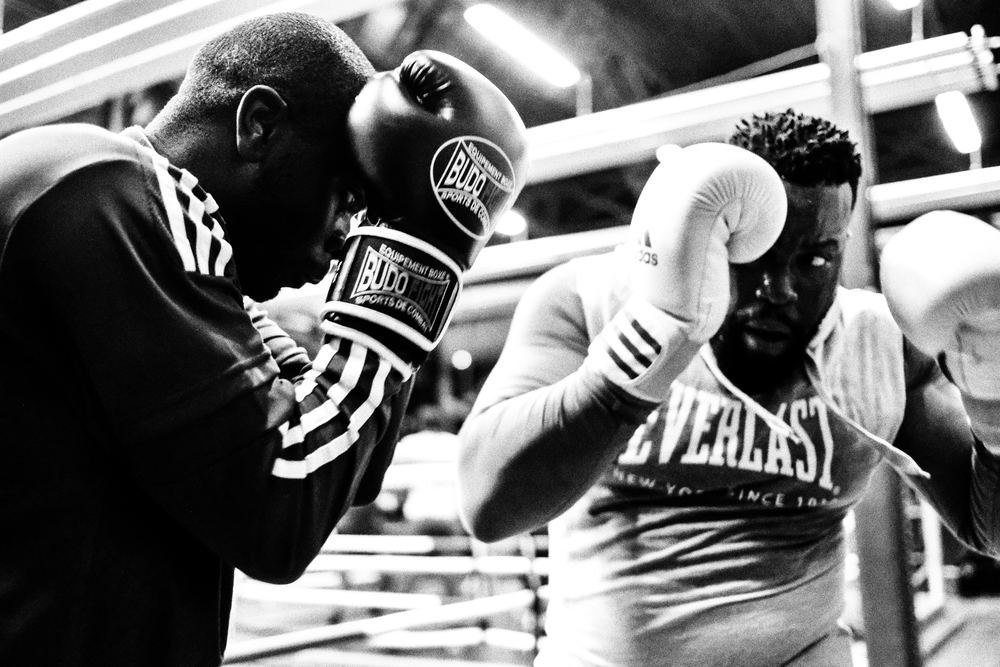Boxing Basics Part III: Defense


Editor’s note: This is a guest post from Chad Howse who is doing a series of posts for ArtofManiliness on the basics of boxing. Check out Part I and Part II.
In a sport where the objective is to hurt your opponent more than he hurts you, the defense is a pretty important thing, which is why we’ll be covering how to defend yourself from getting hit before we go over punching.
The first thing that should be understood about defense is that it is more or less done to serve another purpose. You’re not blocking just for the sake of not getting hit, but blocking to get in a position to return an effective punch that will hurt your opponent or lead to a punch that’ll land flush.
There are two methods to do this:
1. You can block or parry the punch.
2. You can slip the punch.
In the following video, I’ll be showing you examples of how to defend against each punch, either by blocking or slipping. Following the video will be a number of tips. It’s a big topic to cover in one article, so feel free to add any other tips in the comments section.
Tips
Mix it up
Don’t rely on just blocking or just slipping. Just like on offense, keep your opponent guessing as to what you’re going to do next. If you block five punches in a row, your opponent might think he’s going to at least make some kind of contact and load up; slipping the next punch he throws might get him off balance and out of position, which you’ll take advantage of.
Stay tight
You’ll hear announcers say, “This guy has some tight defense.” This means having your elbows in tight to the midsection, hands high and protecting your chin, which is down and also being protected by your shoulders. There isn’t a lot of open space to land anything.
Be on balance
Again, the point of avoiding a punch is to get yourself in position to throw an effective punch in return. To do this you have to stay on balance, on the balls of your feet and avoid doing huge, out of control movements. Keep your movement (both upper and lower body) small, quick, and under control.
Don’t give anything away
Boxing is like a lot of other sports in this way, but let’s use basketball as an example. If a guy comes down and hits two straight three’s, the next time down the court he might throw up a shot fake to get his opponent in the air so he can either draw a foul or gain a clear path to the basket. Boxing is the same; a guy’s jab might be on point, and he might hit with two or three in a row that land, but then he’ll throw out a faint (a fake) to get his opponent opened up and then come around with a hook.
Read your opponent
If your hands are fast enough to parry his jab, wait for him to throw it before showing the parry (block). If your hands are a lot slower than his, keep your hands up and rely on smaller, more subtle movements to block his punches. If he throws out a faint and you commit, it’s a lot easier to recover if you’re under control than if you aren’t.
Make him miss, by a little bit
You don’t need your opponent to miss you by a foot or two; you just need him to miss you. Actually, you just want him not to hit you flush and direct. If he just grazes the side of your head, great! He didn’t do any damage, and it won’t be counted as a point.
So, just like in blocking and in your footwork, stay under control with small movements.
Eyes on the target
I should have gone over this in the first article, but you want to be looking at your opponent’s upper chest. By doing this you’re able to see his hands, shoulders, and head. Some guys throw little hints out before they punch. For example, they might raise their left shoulder before throwing a jab, or they may move their dominant shoulder forward before throwing across (right shoulder on an orthodox fighter, left on a southpaw).
Even when you’re blocking and slipping, keep your eyes on his upper chest and be ready to throw back. Slip and block in a way that allows you to see your opponent at all times. Boxing’s all about angles, and if your opponent throws punches in bunches, gets you to cover up and lose sight of where he is, he can change his angle and get you out of position, which isn’t good.
It’s always the punch you don’t see coming that knocks you out. Keep that in mind.
